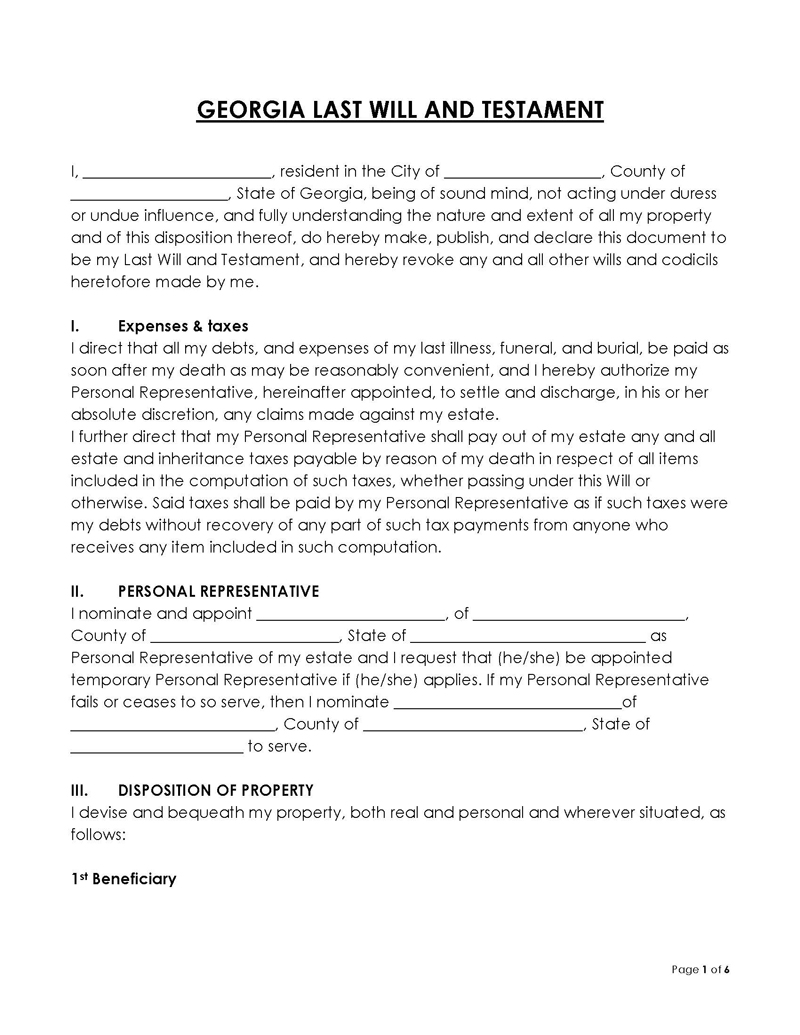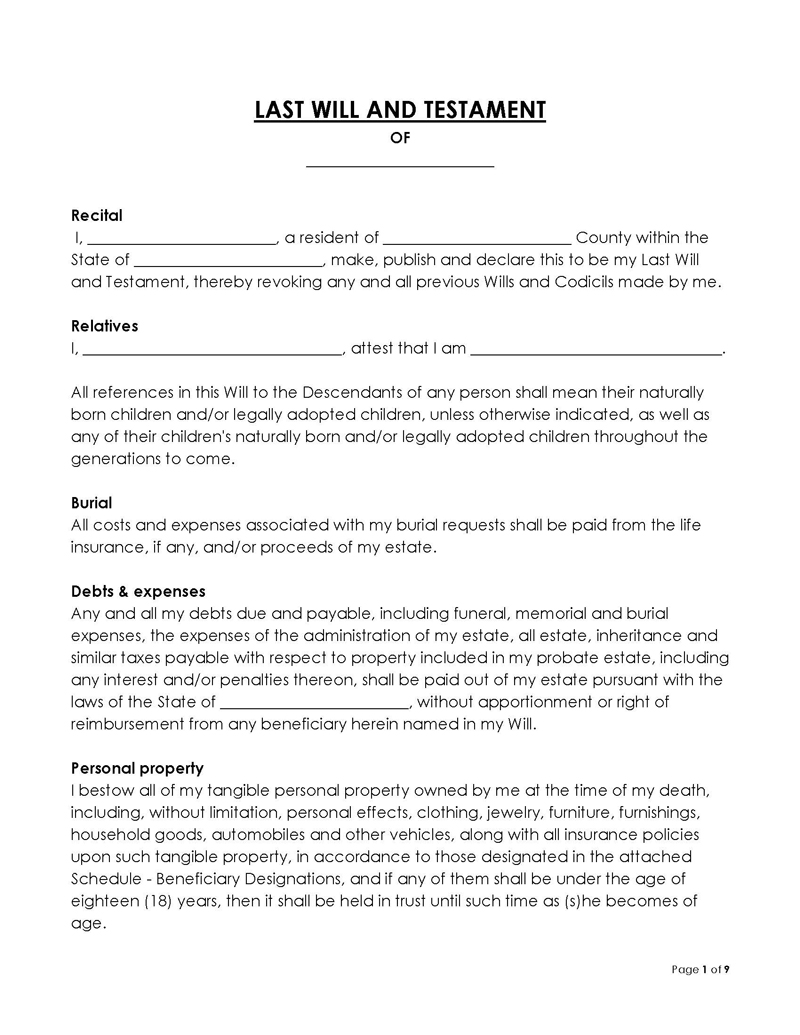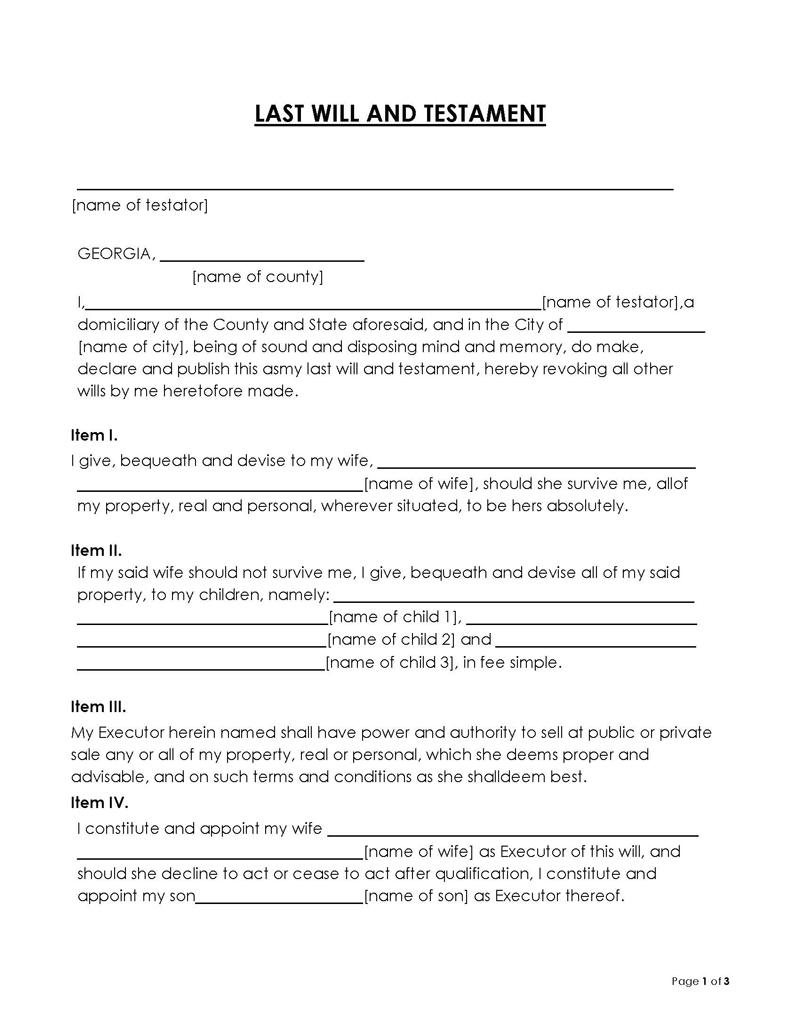A last will and testament in Georgia is a legal decree by an individual (referred to as the testator), outlining his or her intentions and wishes after death. The most important part of the will is the manner in which the estate is to be distributed among the heirs.
You can choose who inherits your assets and property through estate planning. One of the documents required for this purpose in Georgia is the last will. Essentially, the last will serves as a final form of communication for those closest to the deceased. Under this document, the person outlines their desires for their estate following their demise and explains how to execute the wishes of the deceased. The estate includes personal property, real estate, fiduciary funds, cash, etc.
The last will does not need to be in legal jargon, but it should be clear enough so that an executor can follow the wishes of the deceased without difficulty. However, it must specify the beneficiaries and executors. To be legally enforceable in Georgia, it must be witnessed by two individuals and satisfy the state’s requirements. A last will lets you choose who should receive your assets, property, and belongings after you have passed away. This can help reduce any conflict or legal disputes regarding the distribution of the decedent’s assets among family members. This article will cover the fundamentals of what a last will is in Georgia, why it is needed, and the laws that govern it.
Last Will Templates



Why Do You Need a Last Will in Georgia
A last will is not a legal requirement in Georgia; however, it is highly advisable to have one based on its importance in estate planning. It allows you to distribute your assets in a way that you find appropriate. Without a will, your state’s intestacy laws govern this process. This means that the state will decide who inherits your property according to state laws of inheritance, which might not align with your wishes.
In Georgia, a last will increases the chances that there are no disputes over who receives your assets and property when you die. Additionally, you can designate an executor in your will to carry out your instructions. You can legally name a guardian for any minors after your demise as well.
In addition, the document allows you to create a pet trust for any pets you leave behind. This ensures your pets are well taken care of even in your absence. You have the choice of naming or excluding anyone from inheriting your estate, whether or not they are related to you. This implies that you can name individuals and entities as beneficiaries.
Your will goes through probate, which is a court-supervised process. A person known as the executor or personal representative is given the following powers through the legal process of probate: collect all of the decedent’s assets, settle all debts and taxes, and then distribute the remaining assets to the beneficiaries specified in the will.
Laws and Requirements for Making a Last Will in Georgia
Before you begin writing your last will, there are some important things that you need to know about the process. A last will must adhere to state laws in Georgia in order to be valid.
The applicable laws and requirements to be observed for the last will are:
Statute and definitions
Primarily, the document must comply with Georgia Code Title 53 Wills, Trusts, and Administration of Estates Chapter 4 – Wills. Additionally, it must satisfy the definition of “last will and testament,” as stipulated under § 53-1-2(17). A “will” is a legal declaration of a person’s testamentary intention with regard to the person’s property or other matters. According to the law, the term “will” also implies all codicils of the will.
Age of testator
Under Section 53-4-10, a testator must be qualified in terms of age and capacity to execute a last will in Georgia. A testator cannot make a will unless they are 14 years of age or older. The testator must also be free of any legal impediment (in terms of either capacity or liberty to undertake certain actions) towards creating a will (GA. Code Ann. § 53-4-10). The testator should also have a “decided and rational desire” to distribute their property before making a last will. They are also not permitted to draft a will if they are subjected to any form of undue influence because this is regarded as a lack of capacity (Ga. Code Ann. 53-4-12).
Individuals can write a will even if they have a criminal record under GA. Code Ann. § 53-4-11. Individuals who are of advanced age, have eccentric thoughts and behaviors, and have a weakness of intellect are also allowed to create a last will. “Insane” individuals can also write one, but only during a lucid interval. A “monomaniac” is also permitted to make a will as long as it clearly states the testator’s intentions and is unaffected in any way by the condition.
The testator should “freely and voluntarily” write the last will, which implies that it should not be made under duress, misrepresentation, or fraudulent practices that misrepresent the testator’s affections, fears, or sympathies. It must be a representation of the testator’s wishes and not anyone else’s (GA. Code Ann. § 53-4-12.).
Witness requirements
In Georgia, the last will should also be signed in front of two competent witnesses. Under Section 53-4-10, the witnesses must be over the age of 14 and of “good moral character.” The witnesses must also state their relationship to the testator and sign their names in his or her presence.
note
Under Ga. Code Ann. § 53-4-23, a witness cannot be a beneficiary of the will. If a beneficiary witnesses the document, they risk losing their rights under the will.
Self-proving will
The last will can be “self-proving.” According to GA. Code Ann. § 53-4-24, you can do this by signing it in front of a notary public. A self-proved last will expedite the probate process since witnesses do not have to testify in court.
Electronic, oral, and holographic wills
In Georgia, the last wills must be hard copies, implying printed documents. Handwritten, oral, electronic, or digital wills are not recognized.
Signing requirements
All last wills in Georgia must be signed by the testator. Thus, to have your last will legally enforceable, you need to sign it in front of two or more witnesses (GA Section 53-4-20). Another person can sign on your behalf at your request.
Probate and Laws of Intestacy
A probate court must approve a last will before it can be executed in Georgia. The executor can file the document, requesting that the court formally recognize him as the executor of the will and representative of the state. Once appointed, the executor is given “letters testamentary.”
If you die intestate, then the court takes over the distribution of your estate. Intestacy laws prioritize your spouse and children. The spouse receives a third of the state, and the children get equal shares of the remaining portion. If either is not available, then the other party receives the entire estate. If you do not have surviving children and a spouse, the state will distribute your property to other surviving relatives in order of their relationship with you, beginning with parents, siblings, uncles and aunts, grandparents, and so forth.
When one parent passes away before the other in a couple with two children, the surviving children inherit that parent’s share. If you have no surviving relatives, your property will be given to the state.
How to Properly Revoke or Change a Will in Georgia
A last will can be revoked in Georgia. If you would like to do this, you should write the revocation, sign it, date it, and then have two or more individuals witness the signing.
If you want to revoke your last will, you should consider creating a new one, GA. Code Ann. §§ 53-4-41 to 53-4-45. Alternatively, you can physically destroy or obliterate it.
The only way to alter an existing will without making a new one is by means of a codicil, if you are of sound mind enough to sign it. A codicil is a brief document that adds to, rather than replaces, the original will. It may provide more details about inheritance, disinheritance, and so on. The testator’s signature on a codicil is as binding as if there had been no amendment. Codicils can also be used to revoke or change the terms of a will. To do this, however, they must be signed by two witnesses.
Major changes in the family structure, such as having a child or getting divorced after writing a will, affect certain provisions in it. The provisions can be revoked or modified by state laws unless the will explicitly declares that such changes should not affect its contents.
No will can be changed or revoked after the testator’s death except by means of a court order. However, if a will is found to be “repugnant” to the law, it may be set aside, and the estate is distributed in accordance with the provisions of the intestacy laws.
Frequently Asked Questions
No. The only requirements to draft a valid will are that it follows all the legal requirements of the state and be in writing, signed by both the testator and witnesses
Yes. You should use your will to name an executor of your last will who is responsible for implementing the provisions of your will after death. The executor can be a close family member or a person you trust.
No. Georgia does not recognize electronic wills or holographic wills as valid last wills
No. Although the law requires the presence of two or more witnesses at the time you sign your last will, Georgia does not require notarization. A notarized document, however, is simpler to enforce in court if it is ever contested because it serves as proof of your identity and authenticates your witnesses’ and your own signatures.
“Testamentary capable” means an individual has the mental capacity to understand the nature of the document’s provisions, extent, and powers. It also means they have the ability to revoke their will and that they were not incapacitated, such as by a mental or physical illness, at the time they wrote their last will.
Yes, Georgia is one of the few states that allows you to disinherit your spouse. Georgia does not have community property laws, so spouses have no rights by default in this state.
No. Georgia laws provide that a will can be revoked or changed only by court order after the testator passes on. If the will is found to be repugnant to the law, it can be set aside and the estate distributed in accordance with the intestacy laws.
Yes. You may revoke or amend a will before or after it is executed without making a new one by using a codicil. You can make changes and attach them to the existing will. The codicil must be signed and witnessed in the same way that a regular last will is.
If a will is lost and the court determines that the testator destroyed it, the estate is subject to intestacy laws. If the will was not destroyed but was misplaced, a copy can be presented to the court. In such a case, affidavits from the witnesses who signed the will must be presented to the court.











